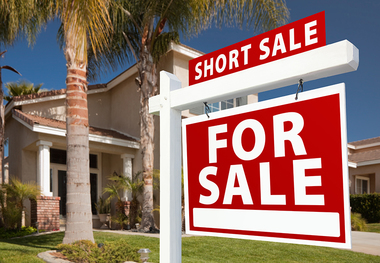.

You work with a bank
You will likely be working with the bank’s broker. These agents work directly with the bank that owns the property. They often have long-standing relationships with the bank, so they also have insight on other foreclosed properties that are due to hit the market. When you find a foreclosed home that you’re interested in, you will contact the bank’s broker directly, and this is the agent you will be working with to purchase the home.
Pay in cash or get preapproved
Many of these homes are cash-only. If they are in the auction stage or if they’re government owned, you must pay cash up front. If the property is REO (real estate owned — the bank now owns the property) you can get buyer financing, but you should come prepared with a letter from your lender stating how much money you are preapproved for. Since these properties are bank-owned, they come at a cheaper price tag — meaning they’ll sell quickly. If you’re not preapproved for a loan and you’re not paying cash, chances are, someone else will snag it before you.
Look at comparable properties before you make an offer
It’s hard to know exactly what to bid on a foreclosed home. The bank could price the home above market value or below. The only way to know how you should bid is to look at comparable homes. Also, take note of how long the home you’re interested in has been sitting on the market. If comparable foreclosed homes are selling quickly, you should bid high; but you might have some wiggle room if the home you’re after has been sitting idle for a while.
Keep in mind that there is no bargaining room when it comes to the condition of the property. Foreclosed properties are purchased “as is.” You will not be able to get a cheaper price by arguing that the floors need replacing or the ceiling is cracked.
Safest to buy when it’s REO
The safest time to buy a foreclosed property is when it’s REO. However, you might not be able to get as much of a bargain compared with when the house was still in auction. When the home is REO, it is owned by the bank and any liens or back taxes have been cleared. Sometimes the house is even cleaned up a bit, but no major repairs are performed. Below are other stages of the foreclosure process that typically offer more challenges to buyers.
- Pre-foreclosure – The homeowner is still in possession of the property. However, they have stopped making payments on the house and the home is selling for below market value. The lender must agree to accept an offer on the home that is less than what is owed on the mortgage loan.
- Auction – If the home doesn’t sell in pre-foreclosure, it goes to auction. This may be because the lender and homeowner couldn’t come to an agreement during the pre-foreclosure stage.
- REO – Real estate owned, meaning that the bank takes possession of the property.
- Government Owned – The home falls into the hands of the government if it does not sell in the REO stage. It takes a long time to purchase a home when it reaches this stage because of excess paperwork and other procedures.
No comments:
Post a Comment